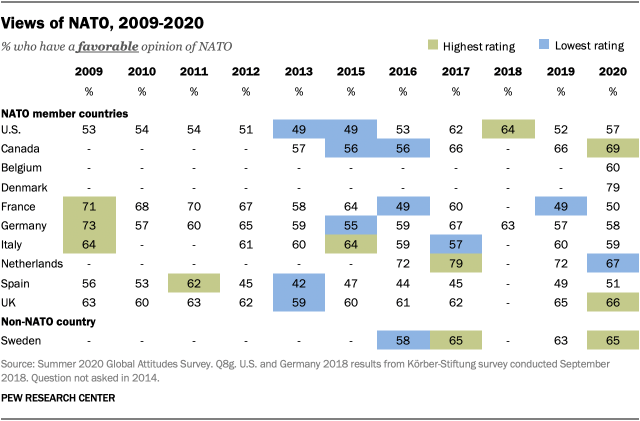NATO has been meeting in Brussels since Tuesday 1is December and for two days. This meeting (by videoconference) of foreign ministers is the last meeting with US Secretary of State Mike Pompeo. The Atlantic Alliance no longer hides its impatience to end the era Trump and to launch a peaceful relationship with America. That of Joe Biden who is expected at Brussels for a peak in early 2021.
While awaiting the establishment of this new relationship, NATO must face challenges.
As the Alliance’s secretary general, the Norwegian Jens Stoltenberg, clarified, the meeting is devoted to the future of NATO, an organization undermined by the mistrust it inspired in Donald Trump and taken aback speak unilateral withdrawal of the Americans from Afghanistan.
But the Alliance is also questioning its ability to adapt in order to cope, on the one hand, with the change in the balance of power with the rearmament of Russia and, on the other hand, with the growing power of the Russian Federation. China as an economic and military power.
Finally, it remains confronted with the problems posed by Turkey, member of the alliance but out of ban. Ankara’s posture on Syrian and Libyan issues irritates member countries, in particular France and Germany.
Variable confidence in NATO
Pending the conclusions of the Brussels meeting, the PEW Research Center published, on November 30, a study on the perception of NATO in ten of the 30 member countries (there were only 12 in 1949, when the Alliance was created).
It shows that on average, 60% of respondents have a favorable opinion of the Alliance, against 30% who have an unfavorable opinion. At the top of the ten countries concerned, Denmark with 79% of favorable opinions (it is a new entrant in this type of survey); at the bottom of the table, France with one in two respondents who positively judge the Alliance:
In 2009, however, 71% of French respondents had a favorable opinion of the Alliance but this percentage has gradually decreased as shown in the table below:
For 2020, it should be noted that Germany has also experienced a significant drop (-15 points). On the negative side, it is the Spaniards (43%) who trust the Alliance the least, followed by the French (38%)
Why this French disenchantment?
Several factors must be taken into account to explain the lack of confidence or interest in NATO:
Emmanuel Macron himself has his share of responsibility, having decided to step up in a weekly maintenance The Economist : What we are currently experiencing is NATO brain death
said on November 7, 2019, the French president before denouncing the total lack of coordination in the strategic decision-making process
. The message had not escaped the member countries but also the French public opinion.
Then, the major US weight within the Alliance, both military and political, reinforces anti-Americanism in certain French circles which have hardly appreciated that NATO, an organization born of the Cold War and guarantor of peace in Europe. against the USSR, either went to fight in Iraq and Afghanistan.
Recent tensions with the Turkish ally also play a role, in particular when they reveal NATO’s inability to manage the initiatives of one of its members. In L’opinion of November 30, Jean-Luc Mélenchon thus judged that it is aboutan uncertain alliance
and that he there are people who can be adversaries or enemies
, citing of course Turkey.
Another factor: the confusion between defense of Europe and Europe of Defense. Who defends Europe
, some French people ask themselves: NATO or the EU? Too much interference and uncertainties exasperate a part of the French public who considers that the Atlantic Alliance constitutes an expense which is less and less useful for an economically badly damaged Europe.
Finally, we must take into account a posture deemed too anti-Russian, NATO including countries very aggressive towards the Russia, like the Baltic States or Poland. However, in French public opinion, there is a real tendency to favor the relaxation card with Moscow and to denounce the massive redeployment of American forces on the eastern borders.
– .


